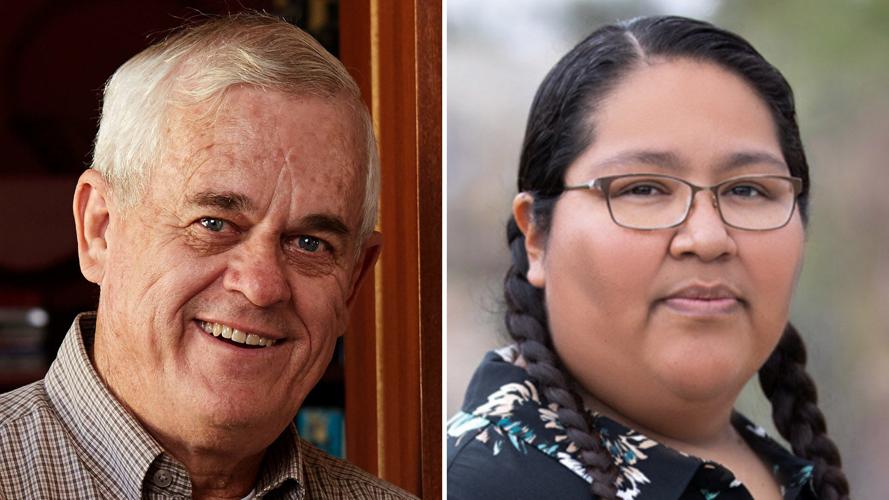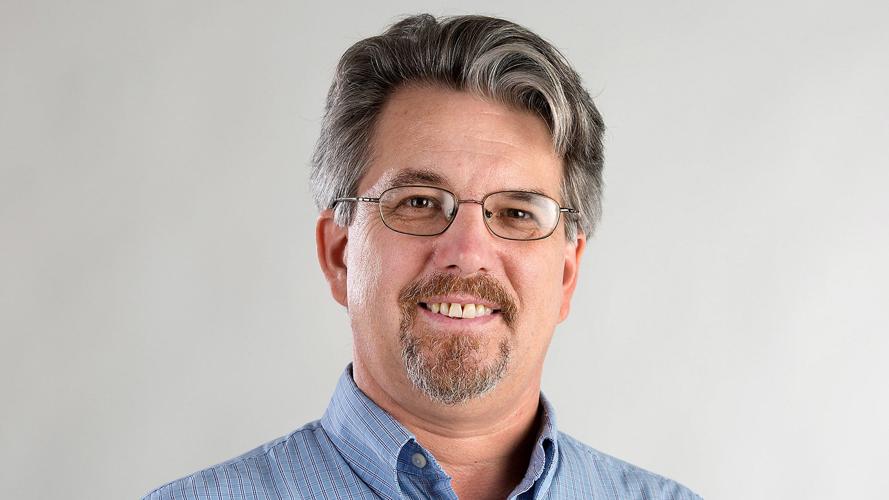If you wanted to find an issue that separates the two candidates for Pima County recorder, you could do worse than hearing their reactions to a voter-registration extension ordered by a federal judge Monday night.
U.S. District Judge Steven Logan, of Phoenix, ruled that problems in registering voters caused by COVID-19 were enough reason to extend Arizona’s registration deadline 18 days, from Oct. 5 to Oct. 23.
Republican Benny White has been working in elections for many years and is something of an institutionalist. He didn’t like it.
Republican Benny White and Democrat Gabriella Cázares-Kelly meet to discuss who would be better served as the next county recorder.
“I think it’s extremely disruptive of the election process,” he told me Tuesday. “Those laws are longstanding, and to change the rules at this late date, even though there is a certain impact by the COVID restrictions, is extremely disruptive to the election process.”
Democrat Gabriella Cázares-Kelly acknowledged the disruption, but said it’s worth the extra effort on the part of Arizona’s county recorders in order to enfranchise more voters.
“It came as kind of a surprise to me, but I definitely see where the need was for that,” Cázares-Kelly said. “These are barriers that are keeping people from being able to participate. They’re antiquated.”
Two voter registration groups sued the Arizona secretary of state in federal court on Sept. 30, saying COVID-19 shutdowns and other problems had made it impossible to register voters. Mi Familia Vota and Arizona Coalition for Change said the problems they’ve had registering voters, caused by the pandemic, violated their First and 14th Amendment rights.
They sued the secretary of state, waiting till Sept. 30 to get last month’s registration results. Those are two things that Pima County’s longtime recorder, F. Ann Rodriguez, didn’t like about the suit.
The 15 county recorders are responsible for voter registration, not the secretary of state, and the plaintiffs sued so late that it was already the voter registration deadline by the time the case could be decided.
“Why did they wait so long to even file it, when I am so damn busy getting 480,000 ballots dropped off at the post office tomorrow?” Rodriguez wondered aloud when I talked to her late Tuesday. She has not endorsed either general-election candidate, after the candidate she supported lost the Democratic primary.
Rodriguez compared changing the registration deadline now to switching drivers while hurtling down the highway at 60 mph. Normally, recorder’s office staff would be transitioning from registration duties to early-ballot duties as early ballots come in over the next couple of weeks.
This year, the election challenge is bigger than ever in Pima County: By mid-September there were already a record 603,000 registered voters, 59,000 more than in 2016.
The recorder’s office is also obligated to provide the political parties with the completed voter rolls after registration closes. Now, she thinks, the parties will simply have to get an incomplete set produced now — the data would be pretty useless to them after Oct. 23.
These are the kinds of concerns that trouble White, the institutionalist who has spent years deep in the weeds of projects like revising the state’s election procedures manual. He also argues the decisions are unconstitutional.
“The judges are in effect changing Arizona election law in violation of the election clause of the U.S. Constitution,” he said. “I don’t think federal judges actually have the authority to issue the rulings they’re ruling.”
In my interview and in an interview by the Arizona Daily Star editorial board, available online, White labeled Cázares-Kelly a partisan activist and said the recorder’s role is not to reach out to groups that have relatively low election participation, like the Tohono O’odham and Pascua Yaqui tribes, but provide equal opportunity.
“They do have an equal opportunity right now,” he said at the editorial board.
He also attributed low turnout on the reservations this way: “I expect education is a problem. I suspect poverty is a problem.”
Cázares-Kelly, who is a Tohono O’odham tribal member, described his comments as a “white supremacist rant.”
Later, in an email to supporters, she said: “Believing people were too uneducated to participate in voting was the idea behind literacy tests and other voter suppression tactics that we have fought so hard throughout our country’s troubled history to eliminate.”
I didn’t take his comments to be “white supremacist,” but they did spell out the differences between how these candidates would run the office, which Rodriguez has occupied for almost 28 years.
Cázares-Kelly would be assertive in reaching out to voters, especially those who have not participated in great numbers; White is more concerned with ensuring that valid voters have an equal opportunity, that ineligible voters are removed from the rolls and would leave it at that.
During the pandemic, Cázares-Kelly said, “We have to think of ways that we’re really serving the public and the needs of the public. We have to respond to these needs.”
The judge’s order, she said, “is responding exactly to the unprecedented times that we’re in.”
Voting ballot rules
How to vote early
Early ballots will be mailed out beginning Oct. 7 and based on questions we’ve heard from readers, we decided to do a step-by-step guide with links and information from the Pima County Recorder’s Office.
Fitz: Vote Early-Check Recorder Site
Updated
Are you registered to vote?
First, residents should check their voter registration by going to the Pima County Recorder's website (recorder.pima.gov). You can check if you are on the Permanent Early Voting List here, too.
If you aren't registered to vote or need to change your address to your current residence, visit the Service Arizona website.
If you want to vote in the Nov. 3 General Election you must register to vote by Oct. 5. Editor's note: Court gives Arizonans only through Thursday, Oct. 15, to register to vote
David Fitzsimmons/The Arizona Daily Star
Fitz: Vote Early-Ballot Request Mail-In Ballot
Updated
If you're already on the Permanent Early Voting List, you will receive an early ballot at your listed address. The early ballots will be sent out starting Wednesday, Oct. 7.
If you usually vote in person but decide that this year you want to vote by mail or drop your early ballot off before the Nov. 3 election day, you need to request an early ballot. Call the Pima County Recorder's Office at 520-724-4330 to request an early ballot or visit here (https://recorder.pima.gov/BallotByMailRequest) to make the request online or print the form and mail it back.
The last day to request an early ballot is Friday, Oct. 23.
David Fitzsimmons/The Arizona Daily Star
Fitz: Vote Early-Ballot Rules

When filling your ballot out, make sure to follow these guidelines:
1. Use a blue or black ball point pen (don't use felt tip or permanent marker, which can bleed through the paper).
2. Sign the white ballot affidavit envelope, and include your daytime phone number in case the Recorder's Office has questions about your signature.
David Fitzsimmons/The Arizona Daily Star
Fitz: Vote Early-No Stamp
Updated
Do not, we repeat, do not use a stamp when mailing in your ballot! It will only delay its delivery.
Fitz: Vote Early-Curbside Drop
Updated
If you receive your ballot by mail, Pima County offers curbside ballot drop-off starting Monday, Oct. 19, with multiple sites throughout the county. Call the Pima County Recorder's Office at 520-724-4350 for locations or visit recorder.pima.gov
David Fitzsimmons/Arizona Daily Star
Fitz: Vote Early-Mail Ballot by Oct. 26
Updated
Make sure to mail your ballot by Tuesday, Oct. 26. The Recorder's Office must have your ballot in hand by 7 p.m., Nov. 3, for your vote to count.
Fitz: Vote Early-Ballot Early Voting
Updated
Another option is to bring your ballot (or just yourself) to an early voting site (recorder.pima.gov) starting Wednesday, Oct. 7. You can drop off your ballot or vote in person at these sites. Just be sure to bring the proper ID (https://webcms.pima.gov/government/elections_department ) if you plan to vote in person. The address on your identification has to match the address on your voter registration.
David Fitzsimmons/The Arizona Daily Star
Fitz: Vote Early-Track Your Ballot
Updated
Once you've dropped your ballot off, you can track it online! (recorder.pima.gov and click on "Ballot by Mail Status")
David Fitzsimmons/The Arizona Daily Star
Fitz: Vote Early-Vote Quail
Updated
You voted!
David Fitzsimmons/The Arizona Daily Star





